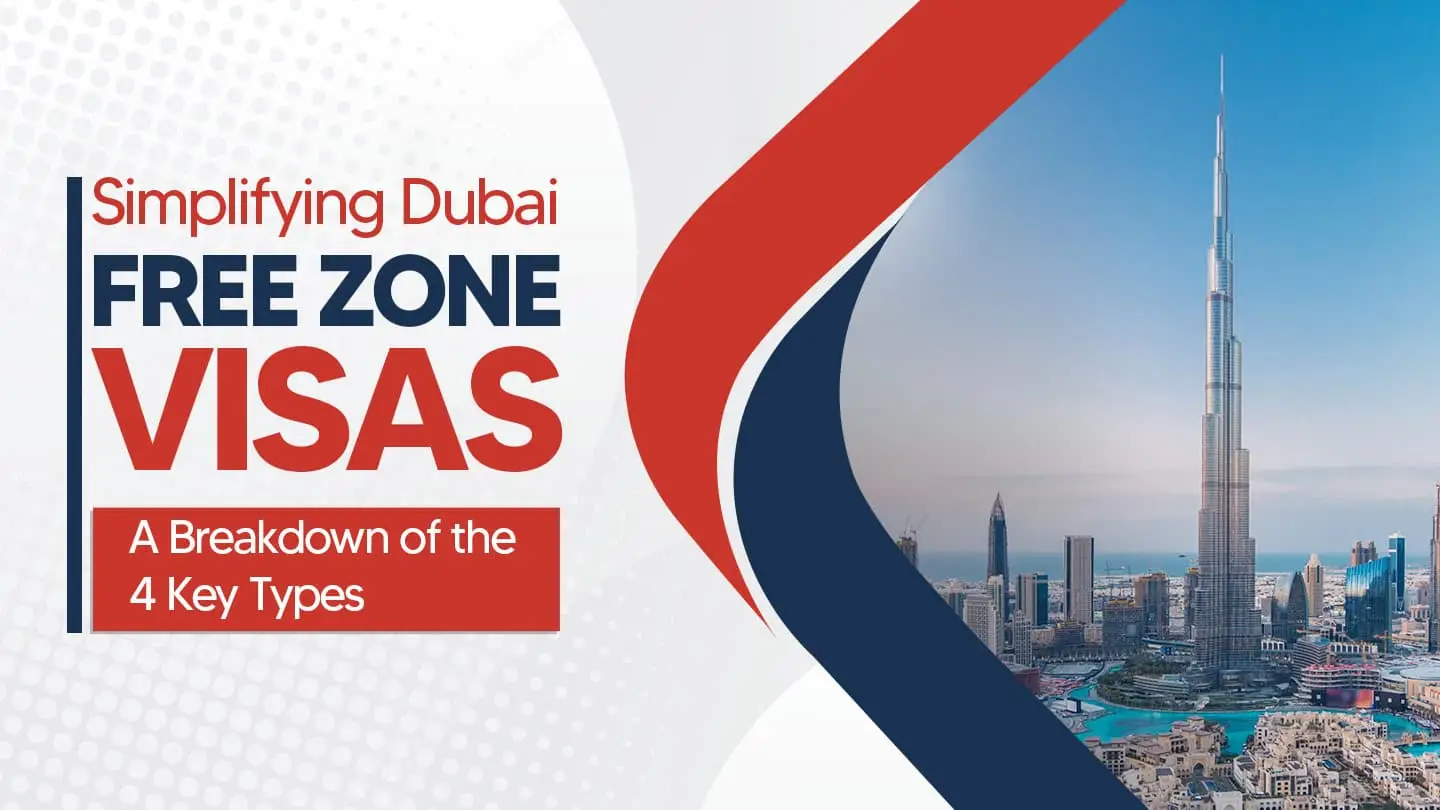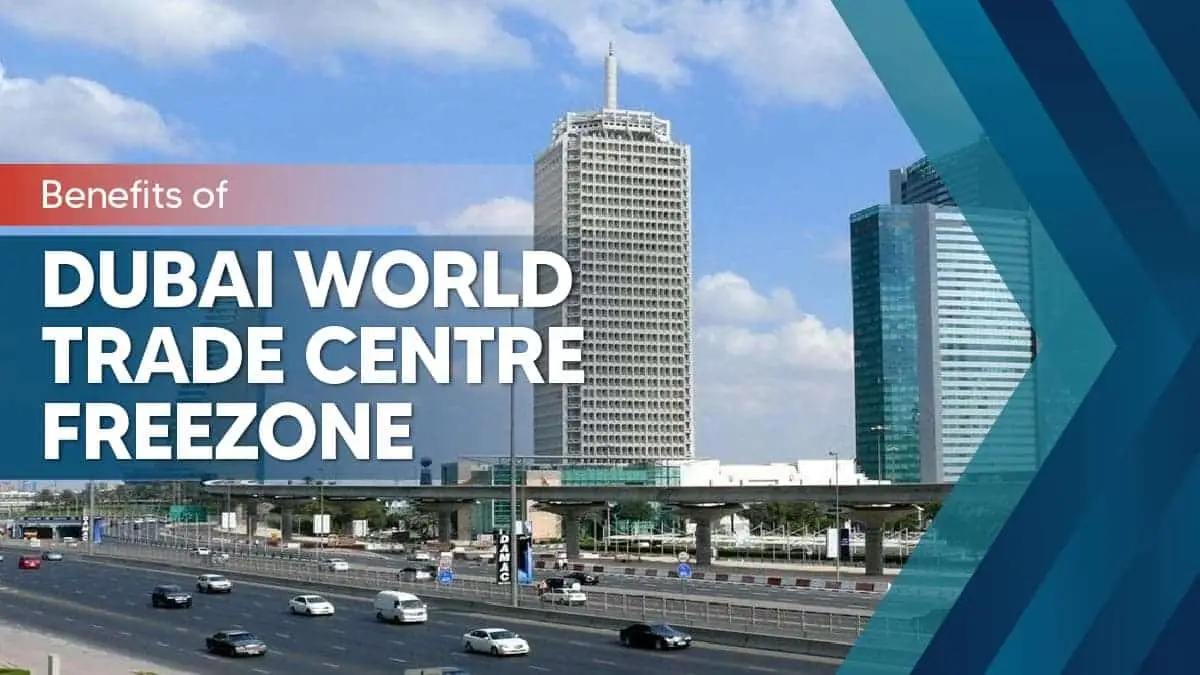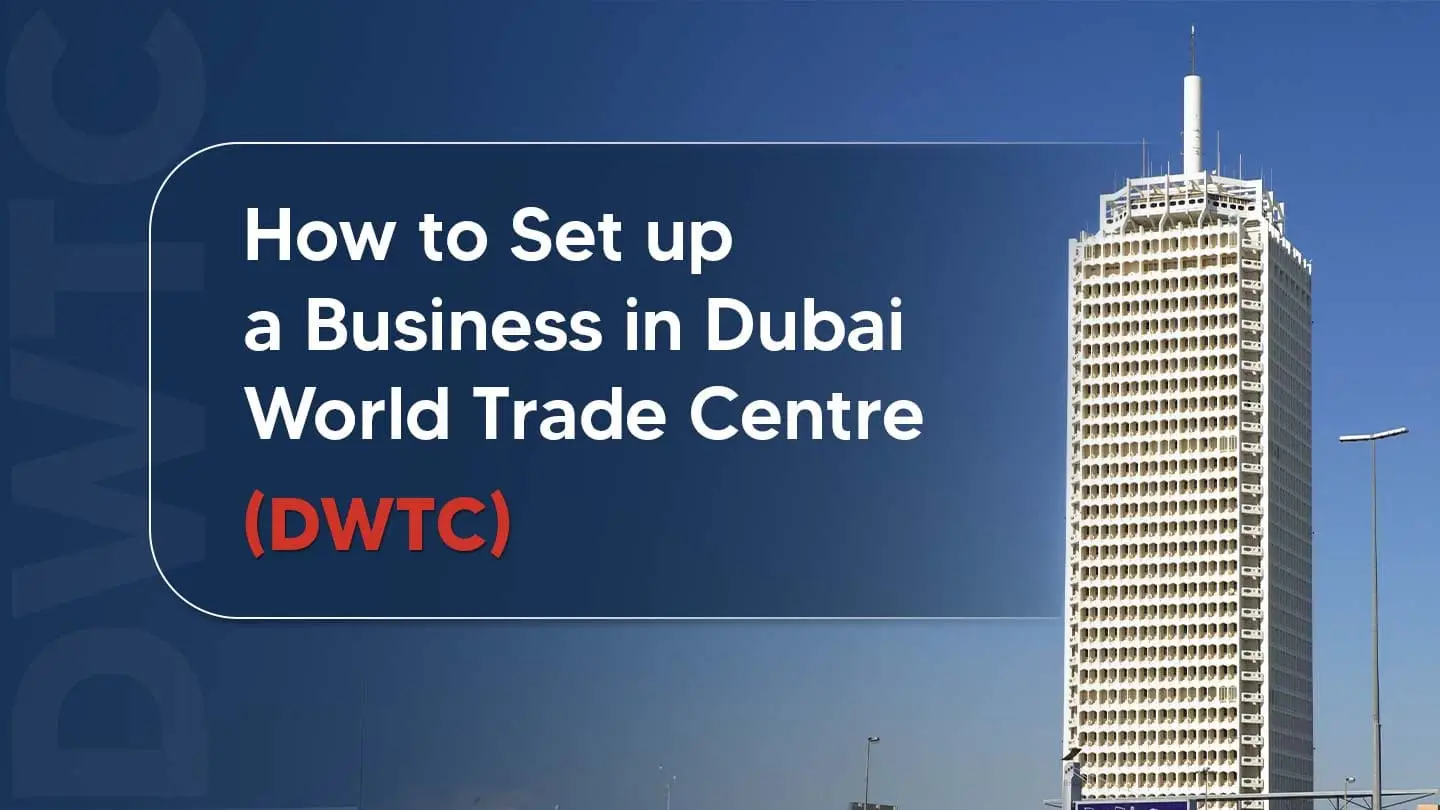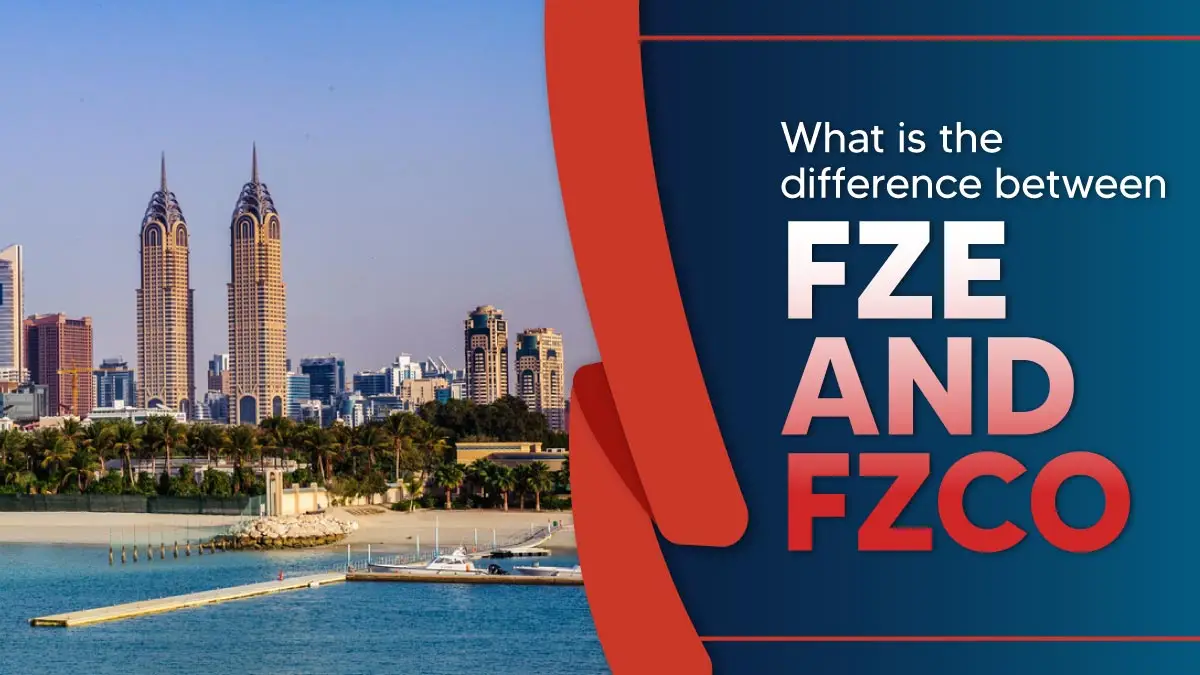Dubai’s free zones are growing business hubs, attracting investors, entrepreneurs, and professionals from around the globe. One of the standout features of these zones is the range of visas they offer, customised to meet the diverse needs of individuals and businesses. Whether you’re an entrepreneur looking to establish your own company, an investor planning to explore lucrative opportunities, or a professional seeking employment, the types of Dubai Free Zone visas provide a gateway to living and working in this dynamic city.
In this blog, we’ll break down the main visa options, highlighting their benefits and helping you find the right fit for your goals.
What is a free zone visa in the UAE?
A free zone visa in the UAE is a residency visa granted to individuals working, investing, or establishing a business within one of the country’s designated free zones. These zones offer favourable conditions such as full foreign ownership, tax exemptions, and streamlined procedures for business setup.
The free zone authority or the company within the free zone typically sponsors the visa. It allows holders to reside in the UAE, sponsor family members, and access various business and government services while also being subject to the rules and limitations of their respective free zones.
1. Benefits of a Free Zone Visa in the UAE
A Free Zone Visa in the UAE offers various benefits for entrepreneurs, business owners, and employees working within the free zone areas. Understanding the types of Dubai free zone visas is essential in making the right decision for your business or career. Here are the key advantages:
2. Full Foreign Ownership
One of the significant benefits of a Dubai Free Zone Visa is that foreign nationals can wholly own businesses.
3. Tax Benefits
Free Zone Visa holders often enjoy tax exemptions, such as corporate tax and VAT relief for a certain period, depending on the specific free zone. This allows businesses to retain more of their profits.
4. Customs Duty Exemptions
In Dubai Free Zones, companies benefit from customs duties exemptions for goods imported and exported within the free zone. This makes it an attractive option for companies involved in international trade.
5. Simplified Business Setup Process
Setting up a business in a Dubai Free Zone offers a remarkably simple and efficient process. Authorities streamline the procedures and minimise the paperwork, making it ideal for entrepreneurs eager to launch their businesses swiftly.
6. Wide Range of Visas
Depending on the types of Dubai free zone visas, individuals can secure visas for themselves, their employees, and family members. This makes it easier to manage staff and their dependents within the UAE.
7. Access to International Markets
Free zones provide businesses with the infrastructure, facilities, and logistical advantages to trade internationally, boosting global outreach.
8. Full Return of Capital and Profits
Businesses in Dubai’s free zones can repatriate 100% of their capital and profits, which can be a significant advantage for foreign investors.
9. Prime Location
Dubai’s free zones are strategically located, making it simple for businesses to access key markets in the Middle East, Asia, and Europe.
10. No Currency Restrictions
Currency control policies do not restrict free zone businesses, allowing them to handle international transactions more easily.
11. Flexibility in Hiring
Depending on the types of Dubai free zone visas, companies can easily hire skilled professionals worldwide without the complexities of mainland visa regulations.
Individuals and businesses can maximise these benefits and grow in one of the world’s leading business hubs by choosing the right free zone and visa type.
Types of Dubai Free Zone Visas
Dubai designates free zones as areas where businesses can operate with tax incentives and fewer regulations. There are several types of Dubai free zone visas, each for specific needs based on business activities, ownership structures, and company sizes. Here’s a breakdown of the types of Dubai free zone visas:
1. Investor Visa
Authorities issue the investor visa to individuals who invest in a free zone business in Dubai. It allows them to own 100% of the industry and is typically valid for 2–3 years. This visa is ideal for entrepreneurs or business owners setting up a company in the free zone.
Investors must meet specific capital investment requirements, and the visa can be renewed or converted into a long-term residence permit, depending on the free zone and business conditions. It provides complete control over the business and the ability to sponsor employees or family members.
Read more: Investor visa in Dubai
2. Employee Visa
Companies registered in a Dubai free zone offer the employee visa to individuals they hire. Sponsored by the employer, this visa links the holder to their employment contract and is typically valid for 1–3 years.
The employee must work full-time in the free zone, and the employer is responsible for meeting the requirements. This visa allows employees to legally live and work in the UAE and sponsor family members based on the employer’s visa eligibility.
3. Freelancer Visa
The Freelancer Visa caters to self-employed individuals who work independently or on short-term contracts. It is suitable for professionals in sectors like media, technology, and consulting.
This visa allows the freelancer to work for multiple clients within the free zone and is valid for 1–3 years. There is no need for a traditional employer-employee relationship, and freelancers can operate their businesses independently. They may also sponsor dependents under certain conditions, providing flexibility and autonomy in their work.
Read more: Dubai Freelance Visa
4. Remote Work Visa
The Remote Work Visa is for individuals working remotely for foreign employers while living in Dubai. It allows professionals to enjoy the lifestyle and amenities of Dubai without committing to a local employer.
The authorities issue the visa for up to 1 year and allow renewal. Applicants must prove their employment with a foreign company and meet a minimum salary requirement. This visa is ideal for digital nomads or anyone looking to experience Dubai while maintaining a job outside the UAE.
5. Multiple Entry Visa
Authorities issue the multiple-entry visa to business owners, investors, or individuals who need to travel frequently to and from Dubai. It allows the holder to enter and exit the UAE multiple times during its validity period, typically 1 to 5 years.
This visa is helpful for professionals who need regular access to Dubai for business or personal reasons. It offers flexibility and convenience for those with international travel schedules, eliminating the need for a new visa for each visit.
6. Family Visa
The Family Visa allows employees or investors in the free zone to sponsor their family members (such as spouses and children) to live in Dubai. Employees or investors in the free zone tie the family visa to their employment or investment visa, and its duration typically matches that of the sponsor’s visa.
To be eligible, the sponsor must meet specific salary and business requirements. The family members can live, study, and access healthcare in Dubai, making this visa an essential option for those relocating with their families.
7. Student Visa
The student visa is for international students enrolled in full-time educational programs at institutions within Dubai’s free zones. Valid for 1–2 years, depending on the duration of the study program, this visa allows students to reside in Dubai while attending school. Some free zones also offer opportunities for internships or part-time employment for students.
To qualify, students must provide proof of enrollment in a recognised educational institution. The visa ensures that students can live and study legally in Dubai, with some limited opportunities to work during their studies.
Dubai free zone authorities customise each type of visa to meet the specific needs of business owners, employees, freelancers, or students. Selecting the proper visa based on individual requirements is essential to comply with local regulations and maximise the benefits of living and working in Dubai.
Eligibility Criteria for a Free Zone Visa
The eligibility criteria for a free zone visa in the UAE can vary slightly depending on the free zone. However, here are the general criteria:
- You must register a business within the free zone or become a partner in one.
- You must have a valid employment contract with a company operating in the free zone.
- Your educational qualifications and experience must align with the job role.
- Some specialised roles may require additional certifications (e.g., medical or legal professionals).
- Your visa must be sponsored by the respective free zone authority or a company registered in the free zone.
- Your passport must be valid for at least six months from the date of application.
- Applicants must have a clean criminal record in the UAE and their home country.
- A police clearance certificate may be required.
- An authorised centre in the UAE must conduct your medical fitness test, and you must pass it.
- Health insurance is mandatory for visa approval.
- You must have no bans or legal issues blocking your entry or work in the UAE.
- Some free zones may have industry-specific requirements or limitations regarding the type of businesses or professionals they accommodate.
Steps to Obtain a Dubai Free Zone Visa
If you plan to work or reside in a Dubai free zone, here’s a streamlined guide to obtaining your visa.
Step 1: Choose a Free Zone
Dubai offers a wide variety of free zones, each made for specific business sectors, such as:
- DMCC (Dubai Multi Commodities Centre): Ideal for trading commodities like gold, diamonds, and other precious metals.
- Dubai Media City: Best for businesses in the media, advertising, marketing, and creative industries.
- Dubai Internet City: Focused on IT, technology, software development, and e-commerce businesses.
The free zone you choose dictates the business activity you can pursue, the visa process, and the facilities offered (e.g., office space and warehouse facilities). Some zones also have additional benefits, such as tax exemptions or faster company registration processes.
Important Tip: Each free zone has regulations, office space requirements, and business setup costs. Selecting the zone that best matches your business activities is crucial to avoid complications later.
Step 2: Register Your Business in the Free Zone
Once you’ve chosen your free zone, proceed to register your business through the free zone authority by completing the following steps:
- Prepare documents: You will typically need a business plan, passport copies of shareholders, and details about the business activities you’ll be conducting. Some free zones may require a business plan outlining the scope of your operations.
- Submit your application: Submit all necessary documents and application forms to the free zone authority.
- Approval and License Issuance: If your application is successful, you will receive a business license. This is crucial, allowing you to operate your business and legally apply for a visa.
The license you receive will depend on the type of business you’re setting up, and it will allow you to open a corporate bank account, hire employees, and legally operate within the free zone.
Step 3: Obtain the Establishment Card (Immigration Card)
The establishment card is essential because it authorises your company to sponsor visas for employees, owners, and family members. It is also known as the Immigration Card.
- Application: You can apply for the establishment card through the free zone authority. The required documents typically include your business license, passport copies of the owners or shareholders, and other company details.
- Issuance: Once approved, the establishment card will allow you to proceed with visa applications for employees, partners, and their dependents.
Why it’s essential: Without this card, your business cannot sponsor any visas, which can delay or prevent you from bringing in employees or partners.
Step 4: Apply for a Visa
With the establishment card in hand, you can begin applying for visas. The type of visa you apply for will depend on your role within the company:
- Employment Visa: If you’re hiring employees, they will need an employment visa to work legally in the UAE.
- Investor/Partner Visa: Business owners or shareholders who are active in the company can apply for this type of visa.
- Dependent Visa: You can bring family members (spouse, children) or domestic staff to live in the UAE with you. The process and requirements may vary depending on the number of dependents.
Step 5: Entry Permit
After authorities approve the visa, they issue an entry permit allowing you to enter the UAE legally. The entry permit is typically valid for 60 days and is necessary for completing the final visa stamping process.
- In-country processing: If you’re already in the UAE on a tourist visa or any other type of visa, the entry permit allows you to change your status without leaving the country.
- Exit & Re-entry: If you’re outside the UAE, you can use this permit to enter, and authorities will process the visa during your stay.
Step 6: Medical Fitness Test
All Dubai Free Zone visa applicants must undergo a medical fitness test. This includes:
- Blood test: This checks for infectious diseases such as HIV and Hepatitis.
- Chest X-ray: Doctors perform this test to check for tuberculosis (TB) or other chest-related health concerns.
Approved medical centres conduct the test, and after you pass, they issue a medical fitness certificate. This step finalises your medical requirements before completing the visa process.
Note: Complete medical tests after receiving the entry permit but before starting the visa stamping process.
Step 7: Emirates ID Application
The Emirates ID is an official identification card required by residents in the UAE. After authorities approve your visa, you must apply for the Emirates ID.
- Biometrics: This process involves capturing your fingerprints, eye scans, and photos.
- Application: Apply for the Emirates ID via the ICP.
- Processing: Authorities will issue your Emirates ID after processing your application. This card is essential for daily activities like opening bank accounts, renting property, and accessing healthcare.
Step 8: Visa Stamping
After completing all the previous steps, the final step is visa stamping. Authorities stamp your UAE residence visa into your passport, officially allowing you to live and work in the UAE.
- Submit passport: Submit your passport to the immigration department to receive the visa stamp.
- Processing time: This typically takes a few days but can vary depending on the free zone.
Once authorities stamp your visa, you can stay in the UAE and begin operating your business.
Step 9: Collect Your Emirates ID
Authorities issue your Emirates ID after stamping your visa.
- Usage: The Emirates ID is an essential document for various services, including banking, health care, government services, and more.
- Validity: The Emirates ID is valid for the duration of your residency visa, typically 2–3 years, after which you’ll need to renew it.
The Dubai Free Zone visa process is systematic but involves several steps, each requiring attention to detail. Working with experts like Shuraa Business Setup can help you through the process more efficiently and ensure all your paperwork is in order.
Documents required for Dubai Free Zone Visa
To apply for a Dubai Free Zone Visa, you’ll generally need the following documents:
- Passport Copy
- Passport-sized Photographs
- Visa Application Form
- Emirates ID
- Trade License
- Entry Permit
- Tenancy Contract
- Medical Fitness Test
- Proof of Employment (if applicable)
- Bank Statement
Make sure to verify the specific requirements with the relevant Free Zone authority, as they may differ based on the Free Zone and the type of visa (e.g., investor, employee, partner).
Cost of Dubai Free Zone Visa
The cost of a Dubai Free Zone visa ranges between AED 3,750 and AED 12,500*, depending on the selected package. Fees may vary across different free trade zones in the UAE, with the cost determined by the specific type of business you intend to operate. You should visit the relevant free zone’s website for the most current fee details.
Knowing the visa cost in advance allows you to plan your budget effectively and ensure you have sufficient funds for the associated application fees. The exact cost will depend on the particular free zone authority. To know the precise cost of a Dubai Free Zone Visa, you can contact our Shuraa business setup.
Choosing the Right Type of Dubai Free Zone Visa for Your Business
The types of Dubai Free Zone visas offer a wealth of opportunities for investors, entrepreneurs, and professionals looking to live, work, or establish businesses in one of the world’s most dynamic business hubs. Whether you’re an investor, employee, freelancer, or digital nomad, there’s a visa type customised to meet your specific needs.
Understanding the available visa options ensures you can take full advantage of Dubai’s tax benefits, flexible hiring processes, and prime locations. To simplify your application process and make the best choice, contact Shuraa Business Setup at +97144081900, WhatsApp us at +971507775554, or email [email protected] for expert assistance.
*Please note that the information provided in this post is for general informational purposes only and may be subject to changes due to updates in government policies and regulations.







